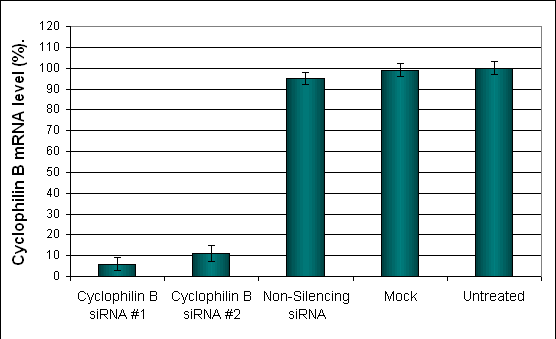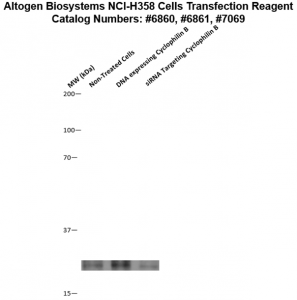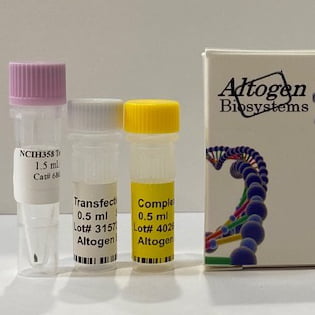Description
Purchase Orders: Click “Add to Cart” button to order, then email PO to orders@altogen.com.
Product Availability: In Stock.
Transfection Reagent for NCI-H358 Cells (Bronchioalveolar Cells, CRL-5807)
- A nanoparticle based liposome formulation
-
Transfection protocols provided for transfection of proteins, mRNA, pDNA, siRNA, shRNA and microRNA
-
Transfection Enhancer and Complex Condenser reagents are provided with the kit
-
Produce higher level of recombinant protein expression with minimal disruption of normal cell function
-
Generate physiologically relevant data you can trust
-
Effective for plasmid DNA/siRNA co-transfection
-
Easy-to-use transfection protocol with reproducible results
-
Low cytotoxicity
-
Download in vitro NCI-H358 transfection protocol: [PDF]
- Download NCI-H358 CRISPR/Cas9 transfection protocol: [PDF]
-
Download PowerPoint presentation for NCI-H358 transfection kit: [PPT]
-
Developed and manufactured by Altogen Biosystems
Transfection Efficiency:
Reagent exhibits at least 89% transfection efficiency of siRNA delivery. Transfection efficiency was determined by qRT-PCR.
Transfection Protocol and MSDS:
Download Altogen Biosystems NCI_H358 Transfection Protocol: [PDF]
Download MSDS: [PDF]
NCI-H358 Cell Line:
NCI-H358 is a human non-small cell lung cancer cell line that was originally derived from a patient with bronchioalveolar carcinoma, a subtype of lung adenocarcinoma. This cell line is commonly used in cancer research as a model for studying lung cancer biology, drug discovery, and development of new therapies. NCI-H358 cells are characterized by their ability to form glandular structures in vitro, which is a characteristic feature of bronchioalveolar carcinoma. These cells also have a mutation in the KRAS gene, which encodes for a protein that regulates cell growth and division, and a deletion in the CDKN2A gene, which encodes for the p16 tumor suppressor protein. Researchers have used NCI-H358 cells to study various aspects of lung cancer biology, including the signaling pathways that drive tumor growth and metastasis, the mechanisms of drug resistance, and the development of new therapeutic agents. This cell line has also been used to study the role of KRAS and p16 in cancer development and to test the efficacy of novel drugs targeting these pathways.
Lung cancer is considered the primary cause of cancer death, accounting for 14% of all new cancer diagnoses and responsible for 1 in 4 cancer fatalities, with the 5-year survival rate of only 18%, as stated by the American Cancer Society. The NCI-H358 epithelial cell line was established in 1981 by A.F. Gazdar et al. from bronchiole tissue of a patient with bronchioalveolar carcinoma, a type of lung cancer. The tumor tissue was removed prior to the patient undergoing chemotherapy. The NCI-H358 cell line has been known to have a doubling time of roughly 38 hours. Ultrastructural studies detected the presence of Clara cells. In addition to being an excellent transfection host, the NCI-H358 cell line is relevant in vitro model for research on medical treatments addressing lung cancer. Altogen Biosystems offers nanoparticle-based transfection reagent kits for this cell line.
Mutations:
| RIMS2 | 9699 | 37 | 8 | 104898359 | 104898359 | Missense_Mutation | SNP | C | G |
| GRM1 | 2911 | 37 | 6 | 146720226 | 146720226 | Missense_Mutation | SNP | G | T |
| NR1H4 | 9971 | 37 | 12 | 100904824 | 100904824 | Silent | SNP | G | A |
| GPR32 | 2854 | 37 | 19 | 51274382 | 51274382 | Silent | SNP | G | C |
| KLHDC7A | 127707 | 37 | 1 | 18809556 | 18809556 | Missense_Mutation | SNP | G | T |
| ABCB11 | 8647 | 37 | 2 | 169826014 | 169826014 | Silent | SNP | C | T |
| VIPR1 | 7433 | 37 | 3 | 42576527 | 42576527 | Silent | SNP | C | T |
| RNF130 | 55819 | 37 | 5 | 179394008 | 179394008 | Silent | SNP | C | T |
| XKR6 | 286046 | 37 | 8 | 10755724 | 10755724 | Missense_Mutation | SNP | G | A |
| CFHR3 | 10878 | 37 | 1 | 196762501 | 196762501 | Missense_Mutation | SNP | G | A |
| FBXL7 | 23194 | 37 | 5 | 15936668 | 15936668 | Silent | SNP | C | T |
| ATAD3C | 219293 | 37 | 1 | 1403783 | 1403783 | Missense_Mutation | SNP | A | T |
Data:

Figure 1. Cyclophilin B silencing efficiency was determined by RT-PCR in the NCI-H358 cells transfected by Cyclophilin B siRNA or non-silencing siRNA control following the recommended transfection protocol. Cyclophilin mRNA expression levels were measured 48 hours post-transfection. 18S rRNA levels were used to normalize the Cyclophilin B data. Values are normalized to untreated sample. Data are presented as means ± SD (n=6).

Figure 2. Protein expression of Cyclophilin B in NCI-H358 cells. DNA plasmid expressing Cyclophilin B or siRNA targeting Cyclophilin B were transfected into NCI-H358 cells following Altogen Biosystems transfection protocol. At 72 hours post-transfection the cells were analyzed by Western Blot for protein expression levels (normalized by total protein, 10 µg of total protein loaded per each well). Untreated cells used as a negative control.
Altogen Biosystems:
Altogen Biosystems manufacturers preoptimized transfection kits for cancer research. Reagents and transfection protocols are optimized for individual cancer cell lines. Altogen Biosystems developed two types of in vivo delivery kits for animal research: Tissue-targeted reagents (delivery into liver, pancreas, and kidney tissues), and in vivo biodistribution reagents (PEG-Liposome, Nanoparticle, Lipid, and Polymer-based kits). Optimized transfection protocols provide efficient cellular delivery of proteins, DNA, and RNA molecules in vitro and in vivo. Read more about transfection technology at Altogen’s Transfection Resource.
Altogen Labs Research Services:
Altogen Labs provides GLP-compliant contract research studies for pre-clinical research, IND applications, and drug development. Biology CRO services include: xenograft models (90+), development of stable cell lines, ELISA assay development, cell-based and tissue targeted RNAi studies, safety pharmacology and toxicology assays, and other studies (visit AltogenLabs.com).
Volume Options:
- 0.5 ml (Catalog #6860)
- 1.5 ml (Catalog #6861)
- 1.5 ml CRISPR (Catalog #2180)
- 8.0 ml (Catalog #7069)
Purchase Orders: Click “Add to Cart” button to order, then email PO to orders@altogen.com.
Product Availability: In Stock.





